Sport’s Trinity: Hyrdation, Nutrition and Performance – Bella Keeley
Last term, the BTEC Sport Year 12 students had a visit from Essex University for a session concerning performance testing and nutrition. The visit was very advantageous for the current unit that we are covering in the course, so we found the day extremely beneficial and learnt a vast amount of information throughout. The knowledgeable Nikki Twine, who is a graduate of sports science from the University of Essex covered several things, including the vitality of hydration when undertaking sporting activities, a series of performance tests using specialist equipment including speed gates, and gave a nutritional talk, covering what our intake of food should contain prior, during and post exercise. We came away from this with a real perception on how we can do the simplest of things which could make the difference to us on the sports field, with additional knowledge that will be accommodating in our progression of the course.
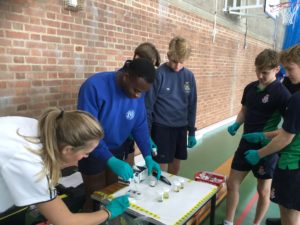
We discovered the crucial importance of hydration, factoring this in to our own sporting lives, as research has shown that performance is noticeably more effective when hydrated. It is recorded that a higher percentage of rebounds, goals and distances covered are achieved when our bodies are at a sufficient level of hydration. An adequate level isn’t even that taxing to achieve; it is suggested that an intake of one to two cups of fluid are consumed an hour before starting. A review of scientific studies showed that endurance athletes had a performance drop of 7 to 60% when dehydrated. In the hydration test we undertook, it was clear that many of the class did not factor in their hydration prior to our session. Results showed that a rating of above 700 is dehydrated. We had results fluctuating from 320, which was Conor Ryan as our most hydrated participant, and a shocking 1050 from Josh Frame who immediately decided an intake of water was necessary!
The reasons for which dehydration decreases our performance are straightforwardly accepted. Your blood becomes more viscous which increases your heart rate, this decreases the amount of blood your heart can pump with one beat, initiating your blood pressure to fall. This makes it progressively difficult for your fat to get to your muscles, so our muscles will burn the limited glycogen that is already there. As your brain is already 85% water, mild dehydration can alter your mood, declining concentration and alertness. Since athletes sweat out 6 to 10% of their body weight during competition, this reiterates the importance of rehydrating. It is also important to be mindful that being thirsty isn’t an indicator of needing to intake fluid. If you wait until you are thirsty, you’ll remain 25 to 50% dehydrated.
Following our hydration tests, we then undertook a succession of performance tests. We used equipment that came in at over £10,000, used to test elite sports people at the university. These tests encompassed power-jumping and using speed gates to test our levels of speed and agility over two different tests.
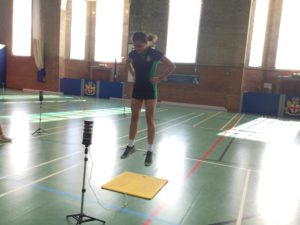
The fitness component of power is the ability to generate and use as much muscular strength over a brief period, using a combination of strength and speed. This is particularly important in sprinters when coming out of the blocks. Another sport with the vitality of power is football, when striking a long-range drive and in boxers delivering a punch, to name a few examples. The power-jumping test was measured on copper plates, testing flight time. The system calculates your vertical jump height by measuring the time that your feet are not in contact with the mat. We were given two attempts with the correct technique which included bending the knees with our arms at our sides. The scores were very varied with Toby Okechukwu who came out on top with a huge 42cm flight. We then had a third attempt where we adopted various techniques to achieve the maximum height we could, which enlarged our results immensely, with Toby getting above 55cm+.
The speed gates were a very impressive piece of equipment that we had the chance to use. With infra-red signals and detectors, the gates record when a beam is broken beginning the timing for our sprint tests. In contrast to a stopwatch, the timing gates provide a precise and reliable measure of speed to the nearest millisecond. We used the gates for a test of speed and agility, through a 20m sprint test and an agility test, in which we had to weave in and out of set markers depending on if a light turned on, directing you in a certain way. This equipment and specific tests are used for varying sports. Agility can be defined as the ability to accurately change direction at speed. This is essential in most sports, but some specific examples may include rugby and tennis. Speed is the ability to move over a certain distance in the quickest time possible. Many athletic sports such as the 100m and hurdles requires elevated levels of speed for the athlete to maximise their performance levels and as sports performers we understood the benefits of these tests in determining the level of sporting capabilities that we are at, in terms of these components of fitness.
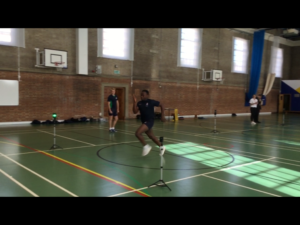
Lastly, we engaged in a nutritional talk in which we learnt what our food intake should be prior, during and after exercise. She gave us a thought provoking quote stating, after natural talent and appropriate training, an adequate diet is known to be the next most essential element for enhancing the training and performance of sports people. The most vital nutritional goal of an athlete is to maintain adequate energy and fluid balance in which both can be subject to rapid changes during exercise, especially in challenging environmental conditions. Inappropriate food choices can lead to lack of energy to support training, competition and optimal recovery or unwanted weight loss or gain.
Before exercise – approximately 2 hours prior – it’s essential to get a source that provides sustained energy, hydration and preserves muscle mass. Carbohydrate intake before exercise fuels your training, helping with recovery. Ensuring that you have a carbohydrate storage will improve high intensity performance. Fats are also a necessity in preparation for exercise. They slow down digestion which maintains blood glucose and insulin levels. During exercise, above all, it is most important to preserve hydration, however eating protein during exercise is also helpful as it helps muscle breakdown, reducing lactic acid. Only a very small amount is required, however. This is only essential in athletes performing for over an hour. Post exercise nutritional needs are essential in recovery, rehydration and refuelling. Glycogen synthesis needs to be maximised after exercise due to its majorly depleted storage that has been used from training. Supplementation of carbohydrates after training will renew the storage up to 6 hours post exercise. Failing to eat within a two-hour window succeeding exercise can slow down recovery rates, so is important to re-energise after your exercise has ended.
In summary, as a class, we all hugely benefitted from our session with Nikki and gathered important knowledge in which we can apply to both our sporting routines, and to our module of application to fitness testing in our lessons. In terms of organisation of this visit, on behalf of the class, I’d like to thank both Mrs Williams and Mr Cohen for this beneficial session.


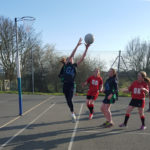

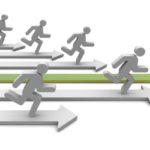










Post Comment
You must be logged in to post a comment.